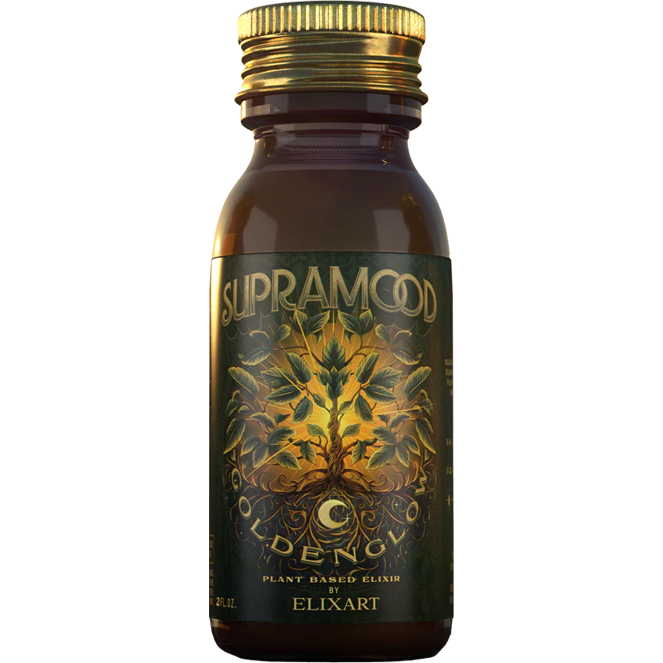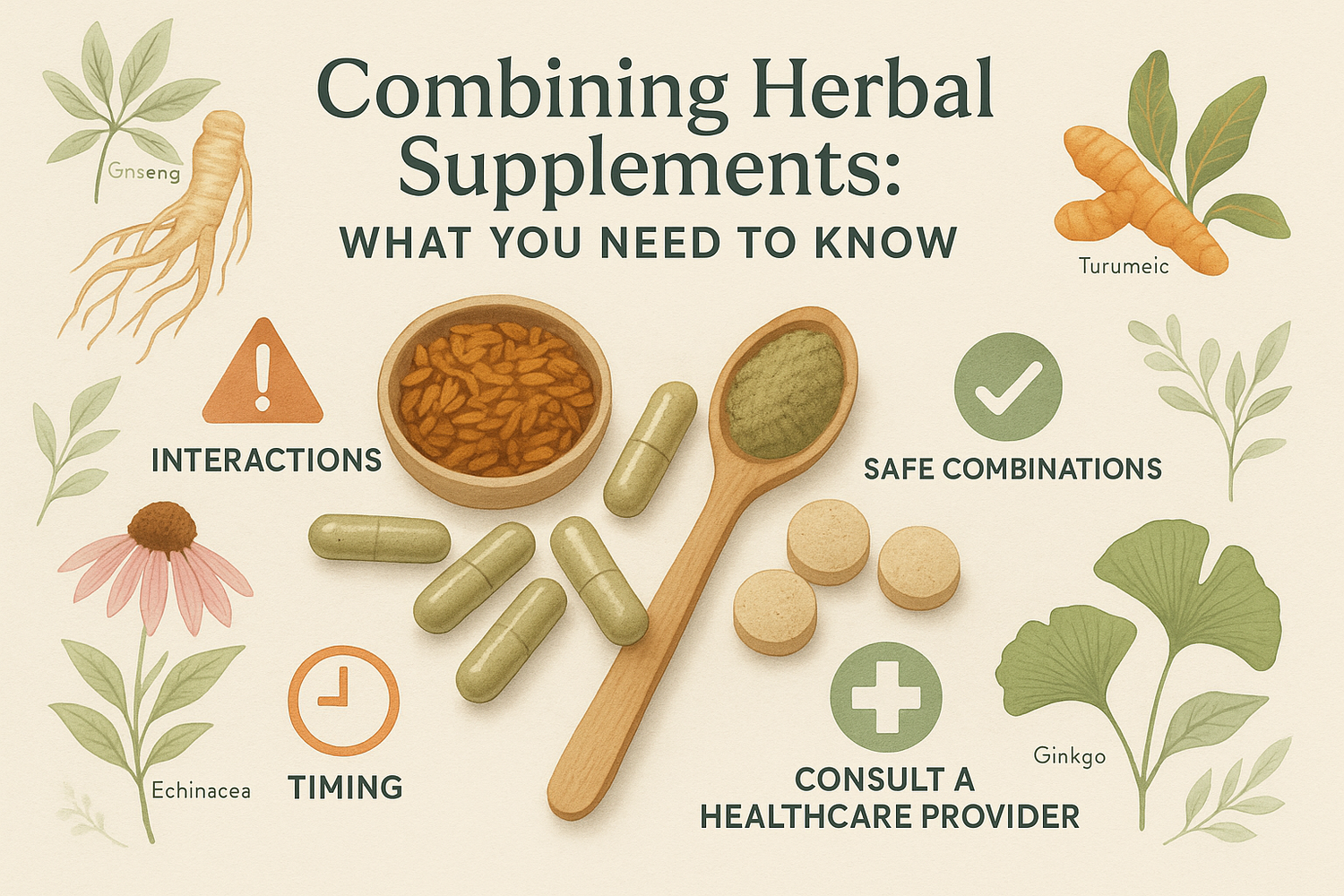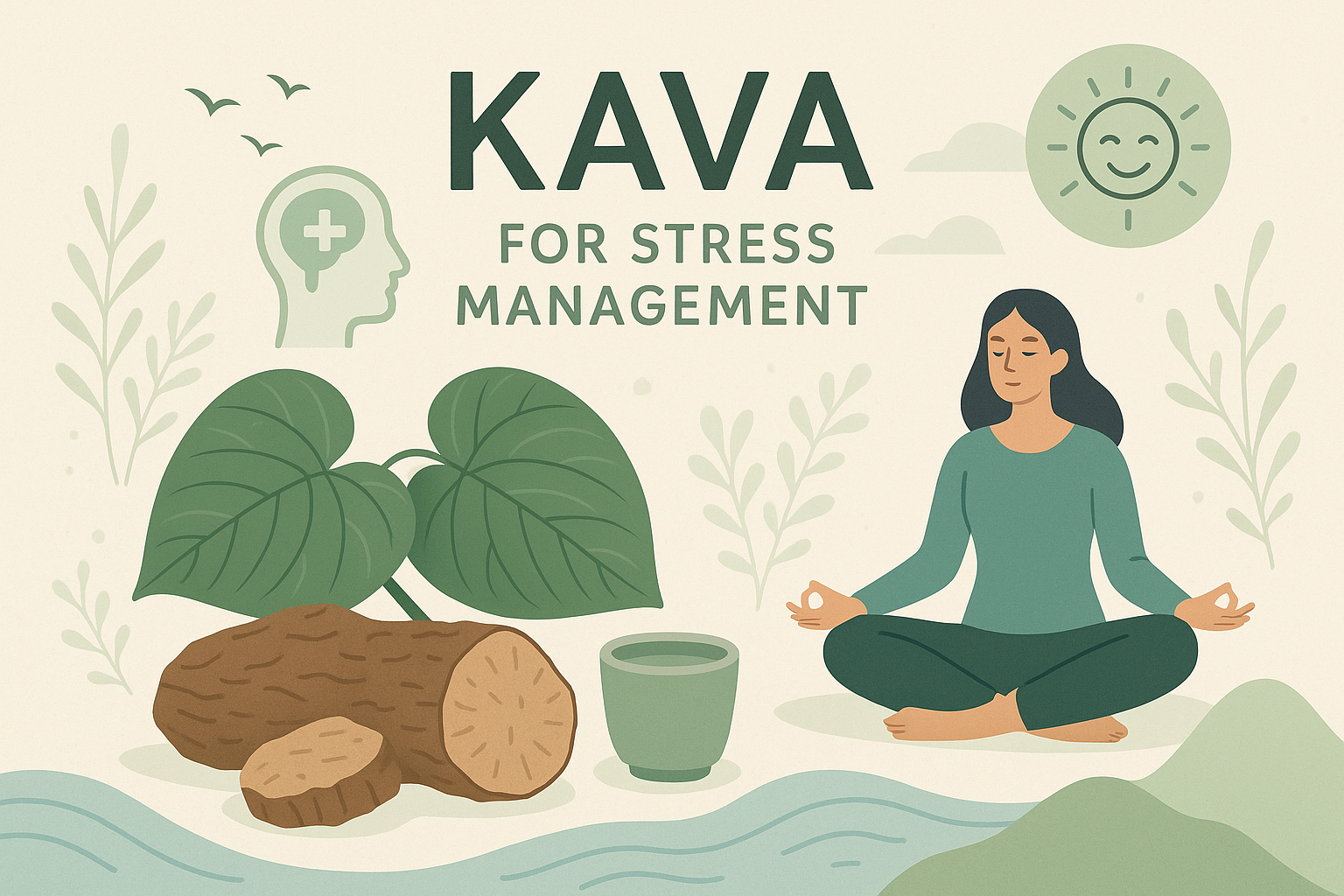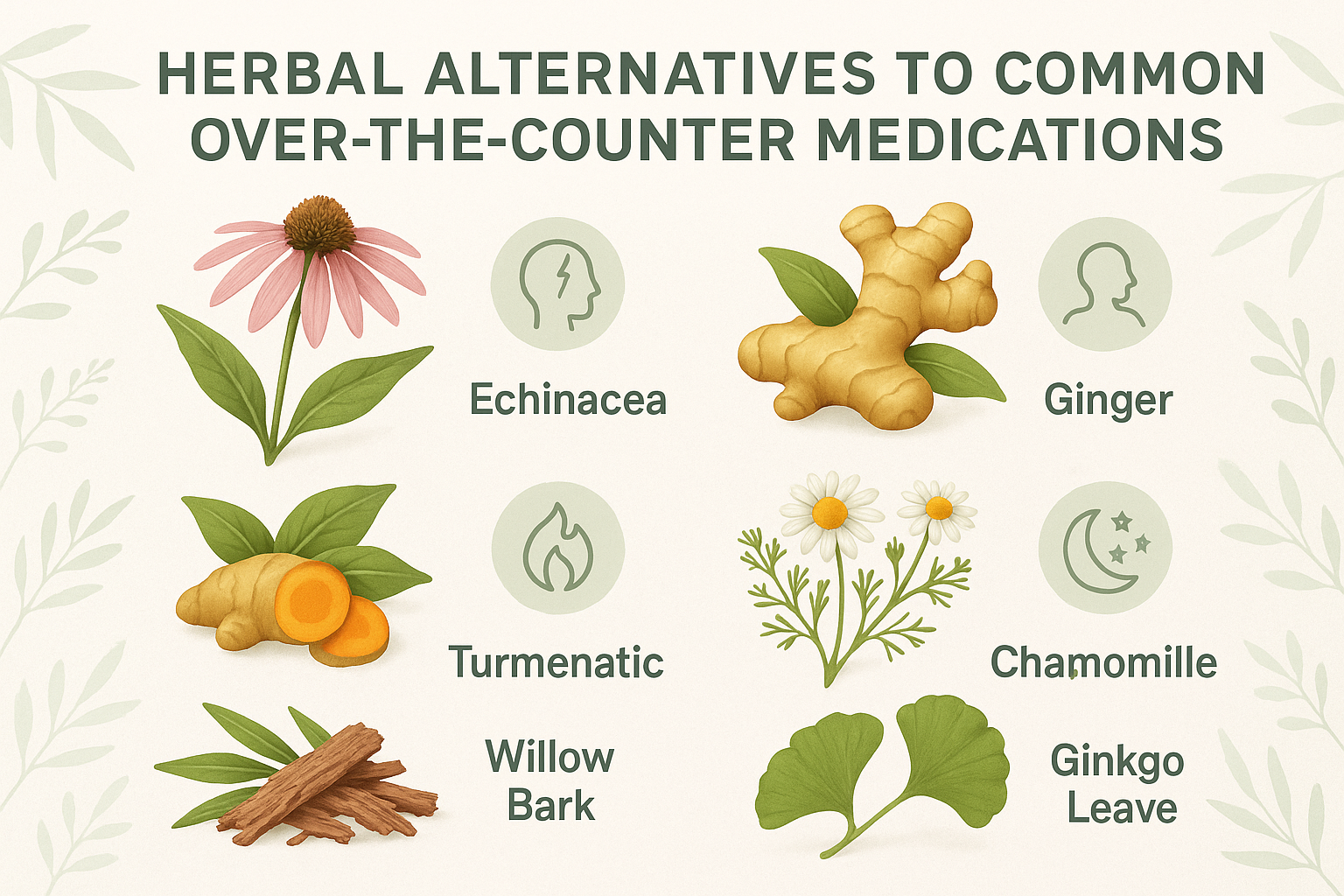Combining herbal supplements for health benefits has become increasingly popular as more people seek natural alternatives to conventional medicine. Herbal remedies, derived from various parts of plants such as leaves, roots, and flowers, offer a diverse range of therapeutic effects. While these natural health products are often perceived as safe, it is crucial to understand both their potential benefits and risks.
In this article, you will learn about the essential aspects of combining herbal supplements safely. Key points include:
- A comprehensive understanding of what herbal supplements are.
- The role of specific herbs like kava in managing stress.
- The risks associated with combining different herbal products.
- Safety considerations and best practices for using these natural remedies effectively.
By the end of this read, you will be better equipped to make informed choices regarding herbal supplements and how to integrate them into your wellness routine.
Understanding Herbal Supplements
Herbal supplements, also known as plant-based remedies, are derived from various parts of plants including leaves, roots, flowers, and seeds. Unlike conventional medications, which are typically synthesized in labs and undergo rigorous clinical testing, herbal supplements are often considered part of the broader category of complementary and alternative medicine (CAM). These natural products aim to support health and wellness by leveraging the medicinal properties found in plants.
Key Differences:
|
Aspect Herbal Supplements Conventional Medications Source
|
Derived from natural plant sources
|
Usually synthetic, created in laboratories
|
|
Regulation
|
May lack stringent regulatory oversight
|
Undergo extensive clinical trials
|
|
Usage
|
Used for general wellness and specific ailments
|
Target particular medical conditions with precise dosages
|
Historical Use of Herbal Remedies
The use of herbal remedies dates back thousands of years. Traditional medicine systems around the world have incorporated plant-based treatments as a primary healthcare approach.
- Traditional Chinese Medicine (TCM): Utilizes herbs like ginseng and ginger for balancing body energy (Qi) and treating various ailments.
- Ayurveda: An ancient Indian system that employs herbs such as turmeric and ashwagandha for holistic health.
- Western Herbalism: Historically used in Europe and North America, focusing on herbs like chamomile and peppermint for their therapeutic properties.
These historical practices highlight the enduring belief in the efficacy of herbal supplements across diverse cultures.
The Role of Kava in Stress Management
Kava, derived from the roots of the Piper methysticum plant, has garnered attention as an herbal supplement known for its calming properties. Traditionally used by Pacific Island communities, kava is celebrated for its ability to reduce stress and promote relaxation.
Effects of Kava on Anxiety
Kava contains active compounds called kavalactones, which are believed to interact with the brain's neurotransmitters. Research suggests that kavalactones may enhance GABA activity, a neurotransmitter known for its calming effects. This mechanism can help alleviate anxiety symptoms and induce a sense of tranquility.
Several studies have explored kava's effectiveness in managing stress:
- A study published in the Journal of Clinical Psychopharmacology highlighted that participants taking kava experienced significant reductions in anxiety compared to those taking a placebo.
- Research in Phytotherapy Research indicated that kava could be as effective as some prescription medications for treating generalized anxiety disorder (GAD) without the sedative side effects commonly associated with pharmaceuticals.
These findings highlight the potential benefits of kava as a natural alternative for anxiety relief. However, it's essential to consult healthcare professionals before incorporating kava into your routine, especially if you are taking other medications or have underlying health conditions.
Risks Associated with Combining Herbal Supplements
1. Medication Interactions to Be Aware Of
Combining herbal supplements with prescription medications can lead to significant drug interactions. These interactions may alter the metabolism of drugs in your body, leading to either increased toxicity or reduced efficacy.
How Drug Metabolism is Affected
Herbs can influence liver enzymes responsible for metabolizing drugs. For example:
- St. John's Wort: Known for treating depression, this herb can accelerate the breakdown of medications such as antidepressants and birth control pills, reducing their effectiveness.
- Ginkgo Biloba: Often used for cognitive enhancement, it can interfere with blood thinners like warfarin, increasing the risk of bleeding.
- Echinacea: Commonly used to boost immunity, it may slow down the metabolism of some medications, potentially causing toxic levels in the body.
Potential Consequences
The consequences of these interactions can be severe:
- Increased Toxicity: When an herb slows down drug metabolism, higher concentrations of the medication can accumulate, leading to toxicity. This is particularly concerning for drugs with narrow therapeutic windows, like certain heart medications.
"Just because a product is natural doesn't mean it's safe. It's crucial to understand how herbal supplements interact with your prescriptions." — Dr. Jane Doe, Pharmacologist
- Reduced Efficacy: On the flip side, if an herb speeds up drug metabolism, it can lower the drug's concentration in the bloodstream, rendering it less effective. For example, reduced effectiveness of birth control pills due to St. John's Wort could lead to unintended pregnancies.
High-Risk Scenarios
Specific groups are more vulnerable to these interactions:
- People with Chronic Conditions: Individuals managing chronic diseases like diabetes or heart disease are at higher risk since they often rely on consistent medication levels.
- Pregnant Women and Nursing Mothers: Hormonal changes can make them more susceptible to adverse reactions.
- Elderly Individuals: Age-related physiological changes can affect drug and herb metabolism differently.
Understanding these risks emphasizes the importance of consulting healthcare providers before combining herbal supplements with prescription medications. This approach ensures safer use and maximizes health benefits while minimizing potential harm.
2. Considerations for Specific Populations
Certain populations are more susceptible to the potential dangers of mixing different herbal products or taking them alongside prescription medications. Understanding the safety of herbal supplements and recognizing who might be at increased risk is crucial.
Older Adults:
- Medication Interactions: Older adults often take multiple prescription medications, increasing the risk of drug interactions with herbal supplements. Herbs like ginkgo biloba can interfere with blood thinners, heightening bleeding risks.
- Side Effects: Age-related changes in metabolism and organ function can make older individuals more vulnerable to adverse effects. For example, liver or kidney issues can exacerbate side effects from certain herbs.
Pregnant Women:
- Hormonal Changes: Pregnancy involves significant hormonal shifts that could react unpredictably with herbal supplements. Herbs like black cohosh may stimulate uterine contractions, posing a risk to both mother and baby.
- Safety Concerns: The safety of many herbal supplements during pregnancy remains under-researched. Pregnant women should seek medical advice before using any herbal products to avoid potential harm.
Individuals with Chronic Conditions:
- Drug Interactions: People managing chronic conditions such as diabetes, heart disease, or mental health disorders must be cautious. Herbs like St. John's Wort may reduce the effectiveness of antidepressants or other critical medications.
- Monitoring: Regular monitoring by healthcare professionals is essential for those with chronic conditions considering herbal supplements.
Understanding these specific risks helps mitigate the potential hazards associated with combining herbal supplements and ensures safer usage tailored to individual needs.
Safety Considerations When Using Herbal Supplements
1. Recognizing Reliable Certifications like THR (Traditional Herbal Registration)
Understanding the importance of quality indicators in herbal products is crucial when considering their use. One key certification to look for is the Traditional Herbal Registration (THR) mark. This certification serves as a benchmark for safety and quality, helping you identify products that adhere to stringent manufacturing standards.
What is THR Certification?
The THR certification is granted by regulatory bodies to herbal products that meet specific criteria related to safety, quality, and efficacy. Products with this mark have undergone rigorous testing to ensure they contain the appropriate ingredients in the correct quantities. This helps minimize risks associated with contamination and incorrect dosages.
Benefits of THR Certification:
- Safety Assurance: Products with a THR mark are manufactured under Good Manufacturing Practices (GMP), ensuring that they are free from harmful contaminants.
- Quality Control: Regular inspections and testing ensure that these products maintain high-quality standards throughout their shelf life.
- Efficacy: Registered products have scientific evidence supporting their traditional use, giving you confidence in their effectiveness.
How to Identify THR-Certified Products:
When shopping for herbal supplements, look for the THR logo on the packaging. This logo usually includes:
- A unique registration number
- The name of the regulatory body responsible for granting the certification
- Specific details about the product's intended use
For example, a bottle of kava might display a THR mark indicating it has been registered by an official body like the Medicines and Healthcare products Regulatory Agency (MHRA) in the UK.
By choosing THR-certified products, you can be more confident in the safety and reliability of your herbal supplements. This is particularly important when combining different herbs, as ensuring each product meets high standards reduces the risk of adverse effects.
Recognizing reliable certifications like THR is just one aspect of safe herbal supplement usage. The next sections will explore other critical factors to consider when incorporating these natural remedies into your health regimen.
2. Risks Associated with Counterfeit Products
Identifying counterfeit herbal supplements can be challenging, but there are common signs you should look out for:
- Suspicious Pricing: Prices that seem too good to be true often indicate a product that may not meet quality standards.
- Lack of Proper Labeling Information: Authentic products typically include comprehensive labeling, such as ingredient lists, dosage instructions, and manufacturer details. Absence of this information is a red flag.
Choosing high-quality formulations that have been properly tested for purity and potency is crucial. Look for THR certification in herbal supplements, as it provides assurance of safety standards upheld by manufacturers. Quality indicators in herbal products can help you avoid the pitfalls of counterfeit items, ensuring that the supplements you use are both safe and effective.
Furthermore, it is important to understand the broader risks associated with counterfeit products. These counterfeit medicines can pose serious health risks due to unregulated ingredients and incorrect dosages. Ensuring product authenticity protects your health and helps you gain the benefits you're seeking from combining herbal supplements.
In addition, the use of counterfeit dietary supplements has been linked to various health risks, including adverse effects from unapproved substances. Therefore, vigilance in identifying genuine products is essential for your safety and well-being.
Mind-Body Connection: A Holistic Approach to Health with Herbs
Incorporating mind-body therapies can significantly enhance the effectiveness of herbal supplements. Practices like yoga, meditation, and tai chi are known to promote mental well-being and can create a synergistic effect when combined with herbal treatments.
Benefits of Mind-Body Therapies with Herbs
Here are some ways in which these practices can complement herbal remedies:
- Yoga: Helps in reducing stress and increasing flexibility. When practiced alongside calming herbs like kava or chamomile, you may experience a profound sense of relaxation and stress relief.
- Meditation: Another powerful tool for mental clarity and emotional balance. When used in conjunction with adaptogenic herbs such as ashwagandha, this practice can help you manage anxiety and improve overall mental health.
- Tai Chi: A form of martial arts focused on slow, deliberate movements, enhances physical coordination and mental focus. Combining this practice with herbs like ginkgo biloba, which supports cognitive function, can optimize your body's natural healing processes.
Creating a Comprehensive Approach to Health
By integrating these mind-body therapies with herbal supplements, you create a comprehensive approach to health that addresses both physical and emotional needs. This holistic strategy not only amplifies the benefits of each component but also promotes a balanced lifestyle.
Exploring Alternative Treatments for Stress Relief Beyond Herbs
Combining herbal supplements with complementary and alternative medicine (CAM) therapies can further enhance stress relief. Two commonly used CAM therapies that pair well with herbal strategies are acupuncture and biofeedback.
Acupuncture: Balancing Energy Flow
Acupuncture involves inserting thin needles into specific points on the body to balance energy flow. Research suggests it can reduce stress by promoting relaxation and releasing endorphins, making it an excellent partner to herbal supplements like kava.
Biofeedback: Mastering Mind-Body Control
Biofeedback teaches individuals to control physiological functions such as heart rate and muscle tension. By using sensors to monitor bodily responses, you can learn techniques to manage stress more effectively. This therapy complements herbal approaches by addressing the mind-body connection, amplifying the benefits of both modalities.
Exploring these therapies alongside herbal supplementation provides a holistic approach to managing stress, ensuring comprehensive wellness support.
Best Practices for Taking Herbal Supplements Safely
Ensuring the safe use of herbal supplements involves adhering to certain guidelines and dosage considerations. Here are some practical tips to minimize risks while maximizing benefits:
- Consult Healthcare Professionals: Always discuss with a healthcare provider before starting any herbal supplement, especially if you are on prescription medications or have underlying health conditions.
- Follow Dosage Instructions: Stick to the recommended dosages provided on the product label or as advised by a healthcare professional. Overdosing can lead to serious adverse effects.
- Choose Reputable Brands: Opt for products from well-known and reputable manufacturers. Look for certifications like THR (Traditional Herbal Registration) which indicate compliance with safety standards.
- Check for Authenticity: Be wary of counterfeit products. Verify the authenticity by checking labeling information, batch numbers, and manufacturer details.
- Monitor for Side Effects: Keep an eye out for any adverse reactions. Report side effects to your healthcare provider immediately.
- Avoid Mixing Without Guidance: Do not combine multiple herbal supplements without professional advice. Some herbs can interact negatively with each other or with medications.
- Store Properly: Store supplements in a cool, dry place away from direct sunlight to maintain their efficacy.
These guidelines on safe use and dosage considerations aim to help you navigate the world of herbal supplements more safely. Staying informed and cautious ensures that you can enjoy the potential benefits without compromising your health.
Conclusion: Making Informed Choices When Combining Herbs for Wellness
Taking a thoughtful approach to combining herbal supplements ensures you maximize benefits while minimizing risks. Understanding potential interactions, consulting healthcare professionals, and seeking reliable products are key steps. Combining Herbal Supplements: What You Need to Know serves as a guide to navigating this complex landscape. Being informed empowers you to make decisions that align with your health goals. Stay aware, stay safe, and prioritize communication with your healthcare provider for optimal wellness outcomes.
FAQs (Frequently Asked Questions)
What are herbal supplements and how do they differ from conventional medications?
Herbal supplements are plant-based remedies used for health benefits, differing from conventional medications in that they often focus on holistic approaches rather than targeting specific symptoms or conditions. They have been utilized in traditional medicine systems across the globe for centuries.
What is the role of kava in stress management?
Kava is a popular herbal supplement known for its calming properties. Current research suggests that kava may effectively reduce anxiety and promote relaxation, making it a valuable option for individuals seeking natural stress management techniques.
What risks should I consider when combining herbal supplements with prescription medications?
Certain herbs can interfere with the metabolism of drugs, potentially leading to increased toxicity or reduced efficacy of medications. It's crucial to be aware of these interactions and consult healthcare professionals before combining herbal products with any prescribed treatments.
How can I identify reliable herbal products?
Look for certifications like THR (Traditional Herbal Registration), which indicates that the product meets safety standards upheld by manufacturers. Additionally, be cautious of counterfeit products by checking for proper labeling, suspicious pricing, and quality indicators.
What are some best practices for taking herbal supplements safely?
To minimize risks while enjoying potential benefits from herbal supplements, individuals should adhere to recommended dosages, consult healthcare providers before starting any new supplement regimen, and choose high-quality products that have been tested for purity and potency.
How can mind-body therapies enhance the effectiveness of herbal supplementation?
Incorporating mind-body therapies such as yoga, meditation, or tai chi can promote mental well-being and enhance the overall effectiveness of an integrative approach involving both herbs and other complementary modalities.







Leave a comment
This site is protected by hCaptcha and the hCaptcha Privacy Policy and Terms of Service apply.